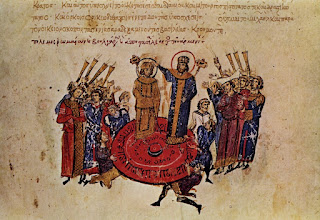Doukas, who had until recently been imprisoned because he had tried to overthrow Isaac's brother (who had usurped the throne from Isaac in 1195 and blinded and imprisoned Isaac), took on the assignment, but considered a way to satisfy everyone involved—and by everyone, he included himself.
Doukas went to the main palace and approached the Varangian Guards—essentially Vikings who were personal bodyguards for Byzantine Emperors—with bribes. Niketas Choniates wrote that he had help from a eunuch who had access to the treasure, but this was unnecessary, since Doukas after his release from prison was made protovestiarios—"first of the wardrobe"—a position as head of imperial finances.
Doukas made himself Emperor Alexios V. On the night of 27 January, the Varangian Guards arrested Issac and Alexios. Alexios was strangled in prison about a week later, and Isaac, old and feeble already, died around the same time. The previously elected Nicholas Kanabo was brought from Hagia Sophia and offered a position in the new emperor's court, but refused. He fled again to the Hagia Sophia but was dragged from it and killed on its steps. (Having been elected by a majority, he was a "loose thread" that a new emperor could not allow to have a rebellion form around.)
Alexios V met with Doge Enrico Dandolo (the meeting was illustrated by Gustave Doré; see above) to negotiate a resolution to the conflict between the Empire and the Fourth Crusade, but there was no easy solution. The Empire did not have the money even to help itself, never mind pay enormous sums that had been promised by the younger Alexios. The Crusaders insisted that Alexios IV, with whom they had the agreement, be restored to the throne. This demand is probably why Alexios IV was killed, to eliminate any reason for the Crusaders to attempt a coup.
Alexios V confiscated money from the aristocracy (endearing himself to the lower classes but alienating his friends and relatives) in order to begin fortifying the city against the inevitable clash with the Crusading army. The death of Alexios IV was a further sign that Constantinople was not about to deal with the Crusaders in good faith. In March of 1204, all members of the Crusade who had taken up residence in the city were rounded up and expelled. That was the final straw.
The Crusaders drew up battle plans, and then made ready to put them into action. See you next time.





